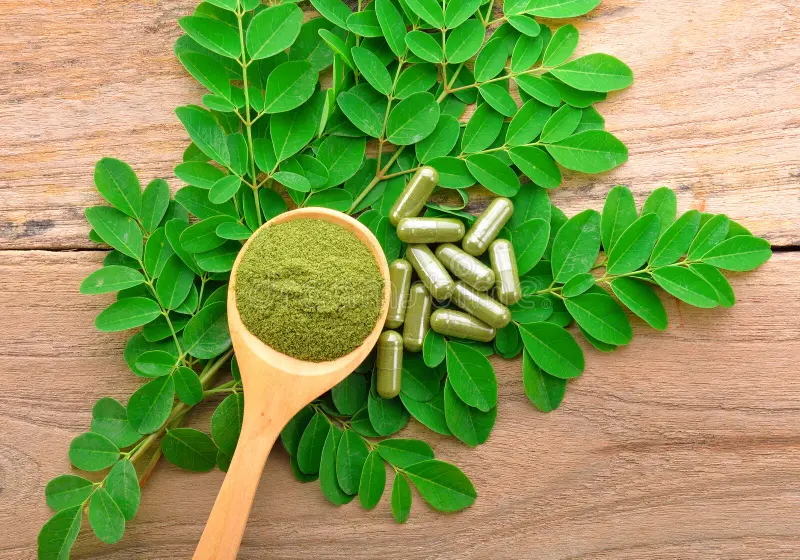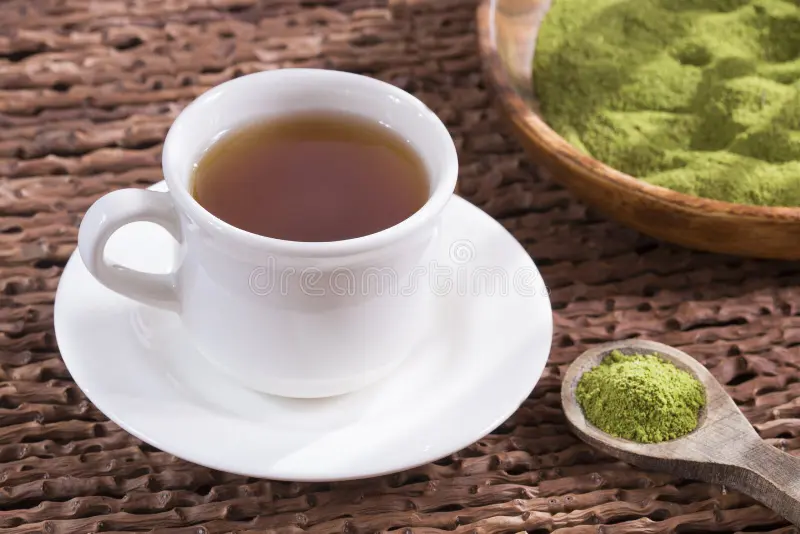In today’s health-conscious world, the search for natural, nutrient-packed superfoods is stronger than ever. One powerhouse ingredient that’s gaining global attention is Moringa leaves. Known as the “Miracle Tree” or “Tree of Life,” Moringa oleifera offers numerous health benefits,from boosting immunity to balancing blood sugar.
In this detailed guide, we’ll explore:
Nutritional profile of moringa leaves
Science-backed health benefits
How to use moringa (powder, tea, fresh leaves)
Potential side effects and precautions
Where to buy and how to store it
What Are Moringa Leaves?
Moringa leaves come from the Moringa oleifera tree, native to parts of India, Africa, and Southeast Asia. Moringa (Moringa oleifera) is a fast-growing, drought-resistant tree known for its highly nutritious leaves, pods, and seeds. The leaves are the most commonly consumed part, either fresh, dried, or powdered.
For centuries, traditional medicine systems like Ayurveda have used these vibrant green leaves to treat everything from inflammation to fatigue. Today, Moringa is celebrated worldwide as a nutritional powerhouse.

Why Is Moringa Called a Superfood?
7x more vitamin C than oranges
15x more potassium than bananas
Rich in iron, calcium, and protein
Loaded with antioxidants (quercetin, chlorogenic acid and beta-carotene)
Nutritional Profile of Moringa Leaves
Nutrient (Per 100g Fresh Leaves) Amount % Daily Value (DV)
Protein 9.4g 19% Contains all nine essential amino acids
Vitamin C 51.7mg 86%
Vitamin A 378μg 42%
Calcium 185mg 18%
Iron 4mg 22%
Potassium 337mg 7%
Fiber 2g 8%Supports digestion and gut health
(Source: USDA Food Data Central)
Proven Health Benefits of Moringa Leaves
Rich in Antioxidants
Moringa leaves are packed with antioxidants that protect cells against free radical damage, lowering the risk of chronic diseases like cancer and diabetes. Chlorogenic acid (also found in coffee) helps regulate blood sugar and Polyphenols protect against oxidative stress and aging.
Anti-Inflammatory Powerhouse
Moringa’s natural anti-inflammatory compounds, such as isothiocyanates, reduce inflammation effectively, that may help with arthritis and chronic diseases.
Supports Blood Sugar Control
Studies have shown that Moringa leaves can lower blood sugar levels by improving insulin sensitivity ,making them beneficial for managing and potentially preventing type 2 diabetes.
Improves Heart Health
With high levels of potassium and antioxidants, Moringa leaves help regulate blood pressure and cholesterol reduce plaque in arteries., supporting overall cardiovascular health.
Boosts Immunity
Thanks to its rich vitamin C content and immune-boosting properties, Moringa can help strengthen your body’s natural defenses against infections.
Enhances Digestive Health
Moringa’s high fiber content promotes healthy digestion, helps prevent constipation, and supports a balanced gut microbiome.
Antibacterial properties may help fight stomach infections.
Promotes Healthy Skin and Hair
Moringa leaves are Rich in vitamins A and E, so these leaves nourish skin cells, combat aging signs, and strengthen hair follicles for thicker, healthier hair.
Provides Natural Energy
Unlike caffeine or sugary drinks, Moringa offers a steady, natural energy boost thanks to its perfect balance of nutrients.
Enhances Energy & Reduces Fatigue
Iron-rich (great for anemia) and B vitamins support energy metabolism.
Athletes use moringa for endurance and recovery.
Supports Brain Health
The antioxidants and amino acids in Moringa support cognitive function, memory, and mood, potentially reducing the risk of neurodegenerative diseases.
Strengthens Bones
Loaded with calcium and phosphorus, Moringa leaves are fantastic for building strong, healthy bones and preventing osteoporosis.
How to Use Moringa Leaves
You can consume Moringa leaves in several ways:

Fresh Leaves: Add to salads, soups, or stir-fries.
Taste: Slightly bitter, similar to spinach.
Dried Leaves: Sprinkle over meals or brew into tea.
Moringa Powder: Blend into smoothies, yogurts, or baked goods.
Dosage: ½ to 1 tsp daily.
Moringa Tea
How to make: Steep 1 tsp dried leaves or powder in hot water for 5 mins.
Benefits: Calming, boosts metabolism
Capsules: Convenient for daily supplementation.
Dosage: Follow label instructions (usually 500–1000mg/day).
Pro Tip: Cooking Moringa lightly preserves most of its nutrients while making it easier to digest.
Are There Any Side Effects?
Moringa leaves are generally safe when consumed in moderate amounts. However, excessive intake may cause:
Digestive discomfort such as bloating and diarrhea.
Pregnancy risk (may stimulate uterine contractions).
Lowered blood pressure
Potential interactions with medications (especially for diabetes or hypertension)
Always start with small amounts and consult your healthcare provider if you have any underlying medical conditions.
Who Should Avoid Moringa?
Pregnant women
People on blood thinners (high vitamin K content)
Those with hypoglycemia (may lower blood sugar too much)
Where to Buy & How to Store Moringa
Buying Tips:
Organic certified (avoid pesticides).
Check for freshness (powder should be vibrant green).
Reputable brands: moringa brand should be reputable
Storage Tips:
Powder: Keep in an airtight container, away from light.
Fresh leaves: Refrigerate (lasts 3–5 days).
Final Thoughts
Should You Add Moringa Leaves to Your Diet?
If you’re looking for a natural, nutrient-dense way to boost your overall health, Moringa leaves are a fantastic choice. They offer an incredible range of benefits with minimal side effects when consumed responsibly.
Whether you’re blending them into a smoothie, brewing them into tea, or sprinkling them on your favorite dishes, incorporating Moringa into your daily routine can be a simple yet powerful step toward better health.
Frequently Asked Questions (FAQs)
Q1. Can moringa help with weight loss?
Yes! Its fiber and metabolism-boosting properties may aid fat loss.
Q2. Is moringa better than matcha?
Different benefits! Moringa has more vitamins & minerals, while matcha has more caffeine & L-theanine.
Q3. Can I take moringa daily?
Yes, in moderation (1–2 tsp powder or 1–2 cups tea per day).
Q4. Does moringa taste bitter?
Slightly earthy, but mixing it into smoothies or honey-sweetened tea masks the flavor.